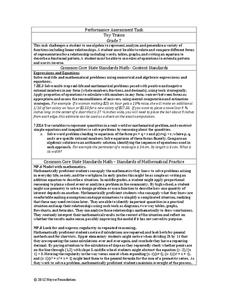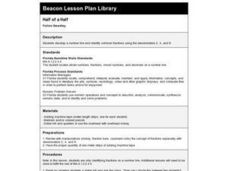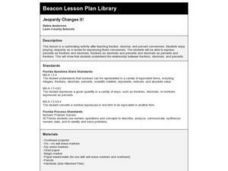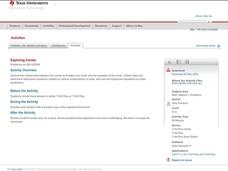Curated OER
Twenty-Eight Multiple Choice No Calculator Allowed AP Calculus BC Practice Exam
In this AP Calculus BC practice exam, learners solve twenty-eight multiple choice problems without the use of a calculator. This worksheet should be completed in fifty-five minutes.
Curated OER
Economics and emissions
Eighth graders produce a manufactured good and monitor energy consumption. In this Math lesson, 8th graders practice their basic math and accounting skills. Students participate in a business simulation.
American Statistical Association
How Fast Are You?
Quick! Snap up the lesson. Scholars first use an online app to collect data on reaction times by clicking a button when the color of a box changes. They then plot and analyze the data by considering measures of center, measures of...
EngageNY
Complex Numbers and Transformations
Your learners combine their knowledge of real and imaginary numbers and matrices in an activity containing thirty lessons, two assessments (mid-module and end module), and their corresponding rubrics. Centered on complex numbers and...
Curated OER
Minutes and Days
Elapsed time is a skill developed by the single question that is the center of this activity. Fifth graders are asked to find out the time that is 2011 minutes after the beginning of 2011. This question addresses the standard that...
Curated OER
Earth Science Regents: The Ellipse
Starting with the instructions to draw an ellipse, and with great pictures, this sheet should help your pupils learn the shapes and measurements involved. Using push pins and string, your class can discover the axis and focus points...
Baylor College
Fuel for Living Things
During a three-part lesson, learners make a cabbage juice pH indicator and use it to analyze the waste products of yeast after feeding them with sugar. The intent is to demonstrate how living organisms produce carbon dioxide, which is...
Baylor College
Fossil Fuels and the Carbon Cycle
Humans are quickly depleting Earth's fossil fuels and locating them is becoming increasingly difficult! Layered muffins are used for models as young geologists take core samples in order to determine the presence of oil. Consider first...
Curated OER
Worksheet 36-Spring 1996
In this math worksheet, students sketch the regions that give rise to three integrals. They find the volume of a solid in the first octant bounded by a defined cylinder and a parabaloid. Students change a function to polar coordinates....
Shoreline Community College
Properties of Logarithmic Functions
Use a straightforward approach to understanding logarithmic properties and their role in solving exponential and logarithmic equations to your math class. The lesson begins with an overview of a logarithmic function and its connection to...
Noyce Foundation
Toy Trains
Scholars identify and continue the numerical pattern for the number of wheels on a train. Using the established pattern and its inverse, they determine whether a number of wheels is possible. Pupils finish by developing an algebraic...
Curated OER
Half of a Half
After your math classes have been introduced to fractions (especially those with denominators of two, four, and eight), introduce them to fractions on a number line with this lesson. Using a meter length of tape, show your class where...
Curated OER
Changes in Force, Motion, and Energy
Eighth graders construct various machines and compare the work done by them.
Curated OER
Medieval Money
Students investigate the history of money as it was back then compare to now. In this algebra lesson, students analyze the type of money used in medieval times, the value of the currency and the coins used. They make a budget using...
Curated OER
M&M Math
Students use M&M candies to discover relationships among fractions, decimals, and percent.
Curated OER
Jeopardy Changes It!
Sixth graders enjoy playing Jeopardy as a review for expressing conversions between fractions, decimals and percents. This lesson provides a fun, motivating way for students to demonstrate their learning!
K12 Reader
Anatomy of a Circle
Make sure your learners are well-versed in circles with a reading passage. Pupils will pick up some important circle-related terms as they read and respond to the five included questions.
Science 4 Inquiry
The Ups and Downs of Populations
As the reality of population decline across many species becomes real, pupils learn about the variables related to changes in populations. They complete a simulation of population changes and graph the results, then discuss limiting...
Curated OER
Book Report Task Cards
With 52 task cards, learners will not run out of things to do with a book they are reading independently or with the class. Tasks include making a poster on a specific topic, writing a summary, drafting a sequel, creating a windsock,...
Curated OER
Exploring Circles
Students explore circles using a graphing calculator. In this circles lesson, students write the equation of a circle with a given center and radius length. Students find the most appropriate model for each combination of data they...
Curated OER
Exploring the Normal Curve Family
Pupils find different characteristics of the bell curve. In this statistics activity, students analyze a family for a specific characteristic. They identify the shape, center, spread and area as they analyze the characteristic of the...
Curated OER
Parts of a Spreadsheet
Students create their own spreadsheet. They identify the different parts that make up a spreadsheet and organize their data. They practice using functions and formats.
Curated OER
Geometry Practice: Loci and Transformations
This resource guides young geometers to create new polygons from others of equal area, compare an image to its reflection and find errors, conduct repeated reflections, map translations, and determine center of rotation. No solutions are...
Curated OER
Investigating Velocity Effects at Takeoff
Learners use, with increasing confidence, problem-solving approaches to investigate and explain mathematical content. They make and test conjectures. They use tables and graphs as tools to interpret expressions, equations, and inequalities.

























